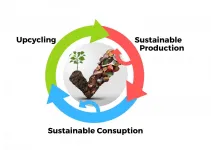(Press-News.org) Air pollution is a key risk factor for cardiovascular disease, and a major contributor to the global burden of disease. Long-term exposure to air pollution has also been linked to an increased risk of death from COVID-19. This dangerous "triple threat" of air pollution, COVID-19 and cardiovascular disease should be taken seriously, warn major health authorities.
Four leading cardiovascular organizations - the World Heart Federation (WHF), American College of Cardiology (ACC), American Heart Association (AHA) and European Society of Cardiology (ESC) - today released a joint statement urging the medical community and health authorities to mitigate the impact of air pollution on people's health.
In 2019, an estimated 6.7 million deaths, or 12 percent of all deaths worldwide, were attributable to outdoor or household air pollution.[1] As many as half of these were due to cardiovascular disease. Air pollution also increases the risk of heart attack, stroke, diabetes and respiratory diseases, which are known to raise a person's risk of experiencing some of the more severe consequences of COVID-19.
"Even before the COVID-19 pandemic, air pollution was an issue of growing concern due to its impact on people's health, although it was frequently overlooked as a risk factor for cardiovascular disease. COVID-19 has brought a new, deadly factor to the equation, and the time has come for the health community to speak up and take action," said Michael Brauer, Chair of the World Heart Federation Air Pollution Expert Group and co-author of the statement.
The statement calls for structural actions to reduce emissions of air pollutants and harmful exposure. It also highlights the important role that healthcare providers play in preventing illnesses related to air pollution, including:
Advocating for air pollution mitigation as a health measure, further research on air quality and its impact on CVD, and interventions to reduce air pollution and its effect on NCDs
Providing patients with personal measures to reduce exposure, such as room air filtration systems
Integrating air pollution into disease management approaches, for example through the use of air quality indices
Participating in the development of guidelines on air pollution and CVD
Supporting ministries of environment, energy, and transportation in their mitigation efforts
Working to educate and raise awareness on the cardiovascular benefits of clean air
Collaborating with senior decision-makers in national, regional, and global governmental institutions to make air pollution related heart disease a priority
INFORMATION:
The statement will be published simultaneously in the flagship journals of all four organizations: the Journal of the American College of Cardiology (JACC), the Journal of the American Heart Association (JAHA), the European Heart Journal (EHJ) and Global Heart.
Notes to Editors
Quote ACC: "Clinicians have a responsibility to educate their patients, their colleagues and their communities at large on the connection between air pollution and cardiovascular disease risk," said Richard Kovacs, MD, MACC, senior author of the joint statement and ACC Immediate Past President. "By advocating for recognition of air pollution as a health factor, working individually with our patients to reduce exposure and associated risks, and integrating air pollution into broader disease management approaches, the health care community can provide support for larger pollution mitigation efforts."
Quote AHA: "Poor air quality can harm heart and brain health, with a disproportionate impact on low-income and poor communities located near sources of air pollution," said Robert Harrington, M.D., FAHA, Arthur L. Bloomfield Professor of Medicine and Chair of the Department of Medicine at Stanford University, Immediate Past President of the American Heart Association and a co-author of the statement. "We must address this problem as a global community to equitably reduce exposure to air pollution and reverse the health harms of poor air quality for all."
Quote ESC: "Air pollution is one of the most underestimated causes of heart disease and stroke," said Professor Stephan Achenbach, President of the European Society of Cardiology. "More research is urgently required to identify susceptible populations and to determine the optimal methods of improving air quality to benefit cardiovascular health. Air pollution needs to be recognized as a major modifiable risk factor in the prevention and management of cardiovascular disease, and measures to reduce its detrimental short-term and long-term influence on cardiovascular health, potentially over generations, are urgently required."
About the American College of Cardiology (ACC)
The American College of Cardiology envisions a world where innovation and knowledge optimize cardiovascular care and outcomes. As the professional home for the entire cardiovascular care team, the mission of the College and its 54,000 members is to transform cardiovascular care and to improve heart health. The ACC bestows credentials upon cardiovascular professionals who meet stringent qualifications and leads in the formation of health policy, standards and guidelines. The College also provides professional medical education, disseminates cardiovascular research through its world-renowned JACC Journals, operates national registries to measure and improve care, and offers cardiovascular accreditation to hospitals and institutions. For more, visit acc.org.
About the American Heart Association (AHA)
The American Heart Association is a relentless force for a world of longer, healthier lives. We are dedicated to ensuring equitable health in all communities. Through collaboration with numerous organizations, and powered by millions of volunteers, we fund innovative research, advocate for the public's health and share lifesaving resources. The Dallas-based organization has been a leading source of health information for nearly a century. Connect with us on heart.org, Facebook, Twitter or by calling 1-800-AHA-USA1.
About the European Society of Cardiology (ESC)
The ESC brings together health care professionals from more than 150 countries, working to advance cardiovascular medicine and help people to live longer, healthier lives.
About the World Heart Federation (WHF)
The World Heart Federation (WHF) unites the cardiovascular community and drives the agenda to reduce the global burden of cardiovascular disease and help people live longer, healthier lives. Together with our Members, we are working to end needless deaths and build global commitment for improved cardiovascular health at the global, regional, national and community levels. We believe in a world where heart health for everyone is a fundamental human right.
To learn more, visit worldheart.org.
Media Contacts
Dana Kauffman, Media Relations Associate, ACC, dkauffman@acc.org
Suzette Harris, Media Advocacy Director, AHA, suzette.harris@heart.org
Jackie Partarrieu, Media Team Manager, ESC, press@escardio.org
Mihela Kralj, Communications Manager, WHF, mihela.kralj@worldheart.org
[1] Institute for Health Metrics and Evaluation, 2020
A Quebec research team has discovered two early plasma markers to detect Alzheimer's disease five years before its onset. The results of this recent study led by the doctoral student Mohamed Raâfet Ben Khedher and postdoctoral student Mohamed Haddad, directed by Professor Charles Ramassamy of the Institut national de la recherche scientifique (INRS), have been published in the prestigious scientific journal Alzheimer's & Dementia: Translational Research & Clinical Interventions (TRCI).
The diagnosis of Alzheimer's disease is usually based on a series of psychometric ...
Support for policies prohibiting smoking and the use of tobacco products on Oregon State University's Corvallis campus grew substantially over a five-year span, especially among tobacco users, a recent OSU study found.
The study, published earlier this month in the journal Preventive Medicine, is unique in its analysis of support for smoke- and tobacco-free campus policies over a long period of time. Most other studies of attitudes toward smoking policies only assess a single point in time.
"Tobacco-free policies are one of the most effective things we can do to reduce the burden of tobacco use, and they are highly supported ...
Navigating, exploring and thinking about space are part of daily life, whether it's carving a path through a crowd, hiking a backcountry trail or maneuvering into a parking spot.
For most of human history, the driving force for day-to-day wayfinding and movement across the landscape was a need for food. And unlike other primates, our species has consistently divided this labor along gender lines.
In new research published in Nature Human Behaviour, scientists including James Holland Jones of Stanford and lead author Brian Wood of University of California, Los Angeles, argue that the increasingly gendered division of labor in human societies during the past 2.5 million years dramatically shaped how our species uses space, and possibly ...
A research team from HSE University and SkolTech, together with experts from the Smorodintsev Research Institute of Influenza in St. Petersburg and the RAS Kharkevich Institute for Information Transmission Problems (IITP), discovered that the SARS-CoV-2 virus independently entered Russia at least 67 times, mostly at the end of February and beginning of March 2020. The vast majority of introductions came from European countries. No cases of introduction from China were registered, which is likely due to the timely closure of borders with the country. Currently, nine local virus lineages are circulating in Russia, which are not present elsewhere in the world. Given that Russia was actively 'importing' the virus from abroad, the researchers have not detected any cases of 'exporting' ...
ROCHESTER, Minn. -- In a new study published in Circulation, Mayo Clinic researchers provide the first preclinical, proof-of-concept study for hybrid gene therapy in long QT syndrome, a potentially lethal heart rhythm condition.
Researchers demonstrated its potential therapeutic efficacy in two in vitro model systems using beating heart cells reengineered from the blood samples of patients with 1 long QT syndrome. They targeted the whole KCNQ1 gene rather than specific LQT1-causative mutations, making this study applicable to all patients with long QT ...
When you think of fungi, what comes to mind may be a crucial ingredient in a recipe or their amazing ability to break down dead organic matter into vital nutrients. But new research by Shuhai Xiao, a professor of geosciences with the Virginia Tech College of Science, and Tian Gan, a visiting Ph.D. student in the Xiao lab, highlights yet another important role that fungi have played throughout the Earth's history: helping the planet recover from an ice age.
A team of scientists from Virginia Tech, the Chinese Academy of Sciences, Guizhou Education University, and University of Cincinnati has discovered the remains of a fungi-like microfossil that ...
A tick saliva study reveals immune responses that could lead to better protection for cattle.
Scientists from Hokkaido University, Japan and Universidade Federal do Rio Grande do Sul and Universidade Federal do Rio de Janeiro, Brazil, have revealed that substances in tick saliva activates immune response-suppressing proteins in cattle that facilitates the transmission of tick-borne diseases. The finding was published in the journal Scientific Reports and could help in the development of alternative control strategies.
The Asian blue tick, Rhipicephalus microplus, feeds on cattle, causing skin lesions, ...
There's a better end for used food than taking up space in landfills and contributing to global warming.
UC Riverside scientists have discovered fermented food waste can boost bacteria that increase crop growth, making plants more resistant to pathogens and reducing carbon emissions from farming.
"Beneficial microbes increased dramatically when we added fermented food waste to plant growing systems," said UCR microbiologist Deborah Pagliaccia, who led the research. "When there are enough of these good bacteria, they produce antimicrobial compounds and metabolites that help plants grow better and faster."
Since the plants in this experiment were grown in a greenhouse, the benefits of the waste ...
Earth is warming rapidly, but there is too little observational data in some regions such as the Arctic or high-altitude areas like the Qinghai-Tibetan plateau to adequately and consistently assess temperature variations across the globe. To better understand how temperatures have increased, an international team led by researchers at Sun Yat-Sen University in China has released a newly merged global surface temperature dataset, including reconstructed land and marine measurements from the 1850s to 2018. The study provides evidence that there was a consistent increased warming trend compared with previous estimations, which closely matches the available observational data and updated simulations covering the past two decades.
The approach ...
A new paper in the Review of Economic Studies, published by Oxford University Press, finds that a generous parental leave policy nurses enjoyed in Denmark caused nursing shortages, which resulted in a decline in the quality of hospital and nursing home care. The study estimates a large increase in nursing home mortality.
Beginning in 1994 a parental-leave program in Denmark offered any parent the opportunity to take up to a full year off work, paid, for every child under the age of nine. The researchers find that many nurses in Denmark took advantage of this program. Nurses, however, could not be replaced on net despite the Danish government's efforts to expand education and immigration ...





